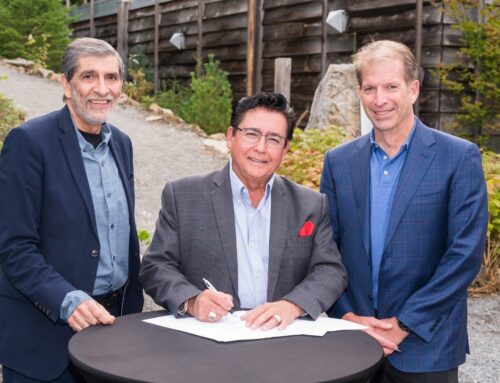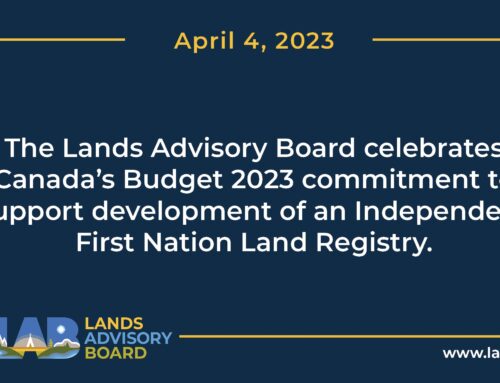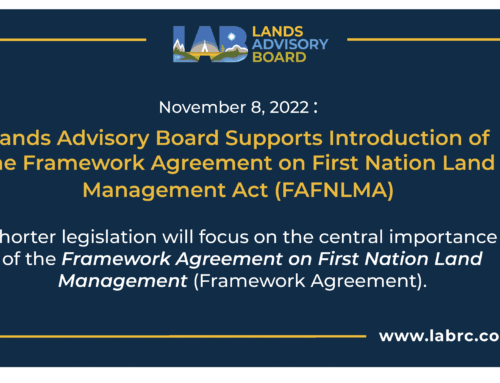Today the Honourable Bernard Valcourt, Minister of Aboriginal Affairs and Northern Development, accompanied by Chief Robert Louie of the First Nations Land Advisory Board and Chief Austin Bear of the First Nations Land Management Resource Centre Inc. welcomed 19 more First Nations into the First Nations Land Management Regime. By signing the Framework Agreement, these First Nation communities can now begin the process of opting out of 34 land-related sections of the Indian Act and assume greater control over their reserve land and resources.
The 19 First Nation communities that signed onto the Framework Agreement today are:
- New Brunswick: Madawaska Maliseet
- Quebec: Abénakis de Wôlinak
- Ontario: Long Lake, M’Chigeeng, Magnetawan
- Manitoba: Nisichawayasihk (Nelson House), Norway House, Sagkeeng (Fort Alexander)
- Saskatchewan: English River, Yellow Quill
- British Columbia: ?akisq’nuk, Homalco, K’omoks, Lower Nicola, Malahat, Metlakatla, Nak’azdli, Tahltan, and Soowahlie.
“The First Nations Land Management Regime is a proven and successful tool of economic development and reconciliation. We will continue to work with interested First Nations like those represented here today to create jobs and economic opportunities, and also to achieve reconciliation between Canada and First Nations, through initiatives like the FNLM Regime.”
– Bernard Valcourt
Minister of Aboriginal Affairs and Northern Development
“I am honoured to welcome the 19 signatory First Nations today. A very prosperous future awaits them. Just recently, the international firm KPMG completed a study on the benefits of the Framework Agreement for all the participating First Nations. Investments on reserve now are estimated at $270 million and thousands of on-reserve jobs are being created for both members and non-members. Our First Nations are forging new partnerships with businesses, investors, bankers as well as with provincial and municipal governments. Land management activities are being completed at the speed of business, which is significantly faster than under the Indian Act. Business decisions are now governed by the First Nations themselves. We are on the verge of a new era of prosperity for our communities, and I am elated that 19 additional First Nations today will be able to participate.”
– Chief Robert Louie
Chair, First Nations Land Advisory Board
“The Framework Agreement already has proven that it greatly improves the quality of life for our signatory communities. The Framework Agreement promotes self-sufficiency, Community pride, and protects our traditional values. First Nation leaders now are able to govern lands and resources to achieve the overall vision of their communities. The result is a strengthening of Aboriginal culture and a renewed respect for our role as stewards of the land. I am proud to see 19 new signatories today begin the journey to greater autonomy. I thank Canada and Minister Valcourt for their continued support. Chief Louie and I will continue to work diligently in order for all First Nations to be offered this opportunity to opt out of the Indian Act and resume jurisdiction over their reserve lands and resources.”
– Chief Austin Bear
First Nations Land Management Resource Centre Inc.
“The Magnetawan First Nation is very pleased to be joining the First Nations Land Management Regime. The Magnetawan First Nation sees this as an important first step in the direction of self-government by providing self-determination to manage our lands more effectively and efficiently than under Indian Act. This Regime provides greater opportunity to be more competitive on a number of important economic development projects in our community.”
– Chief William Diabo,
Magnetawan First Nation
“Taking control of land management is a vital step for the Akisqnuk First Nation to assert control over our reserve lands. Development and ratification of a land code will allow the First Nation and Akisqnukniks that live on reserve to respond to opportunities on our own terms and at the speed of business. These important steps will further our progress toward self-government and allow us to get out from under Aboriginal Affairs’ and the Indian Act’s control of Akisqnuk First Nation Land.
It is hoped and expected that this radical change will enable prosperity on the Akisqnuk First Nation that is unprecedented since the reserve was created in 1886 — almost 130 years ago.”
– Chief Lorne Shovar,
Akisqnuk First Nation
For the full press release, please click here.
Click here to watch the APTN National News coverage of the March 3, 2014 signing ceremony.
(Correction: There are currently 112 signatory communities to the Framework Agreement)




